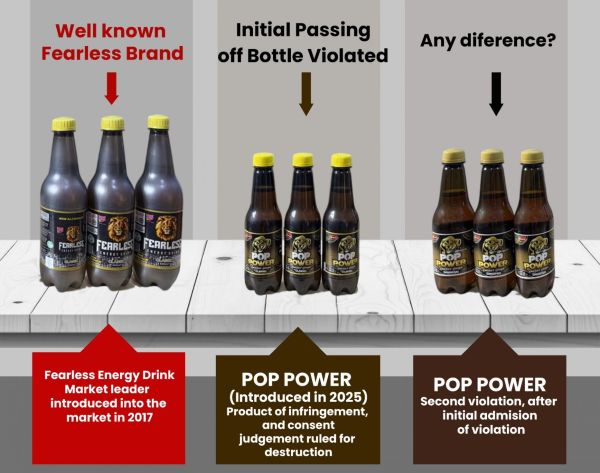Rite Foods Demands ₦1.6bn from Mamuda Beverages over Alleged Product Imitation

A bitter intellectual property (IP) battle has re-ignited in Nigeria’s fiercely competitive energy drink market, as Rite Foods Limited, the maker of the popular Fearless Energy Drink, has slammed Mamuda Beverages Nigeria Ltd, producers of Pop Power Energy Drink, with a fresh lawsuit seeking ₦1.6 billion in damages over alleged trademark and design infringement.
Filed before Justice Emeka Nwite of the Federal High Court, Abuja under suit number FHC/ABJ/CS/705/2025, Rite Foods is accusing Mamuda Beverages — a Kano-based Lebanese-backed firm — of reproducing a deceptively similar bottle design to its flagship energy drink, in violation of earlier court-sanctioned settlement terms and intellectual property rights.
Beyond the Bottle: The Legal Battle Over Branding
At the core of the legal firestorm is the design of a 500ml plastic bottle created and registered by Rite Foods in 2020 under Nigeria’s Patents and Designs Act, featuring distinctive colors, shape, a lion-head emblem, and the “Fearless” branding — a packaging style the company claims to have pioneered in a market previously dominated by 250ml and 473ml metal cans.
Rite Foods alleges that Mamuda’s Pop Power, launched in a smaller 330ml plastic bottle, mirrors its Fearless brand in bottle shape, label placement, color patterns, and design cues, creating market confusion. According to the claimant, consumers and retailers now refer to the rival product as “small Fearless”, which it argues dilutes its brand equity and infringes on its exclusive IP rights.
A Consent Judgment Breached?
This isn’t the first legal skirmish between the two beverage giants. In January 2025, Rite Foods had filed an earlier suit (FHC/ABJ/CS/139/2025) before Justice Inyang Ekwo, securing interim injunctions and entering into a consent judgment with Mamuda on March 4, 2025. Under the agreement, Mamuda reportedly pledged to redesign its Pop Power product — including changes to the cap color, label lines, the word “Classic”, and overall bottle coloration.
Crucially, Rite Foods did not demand monetary compensation in the initial case — opting instead for design separation to safeguard its intellectual property.
However, the plaintiff now claims that Mamuda reneged on the agreement almost immediately by reintroducing a “remodel” of Pop Power that is substantially similar to the original infringing version — prompting this new ₦1.6 billion lawsuit. The reliefs sought include:
- ₦1 billion in general damages for infringement
- ₦60 million in legal costs
- A perpetual injunction restraining Mamuda from producing or selling the product
- Destruction of all infringing Pop Power products in circulation
Mamuda’s Defence: Abuse of Court Process
Mamuda Beverages, however, is pushing back, filing a preliminary objection through its counsel, Chief Offiong Offiong, SAN, urging the court to dismiss the suit. The company contends that the matter has already been adjudicated via the earlier consent judgment and that the Federal High Court is functus officio — meaning it has exhausted its authority over the dispute.
Mamuda insists it implemented all agreed modifications to the product design before resuming production and thus considers the current lawsuit a duplicative action and an abuse of court process.
Justice Nwite has scheduled the hearing on Mamuda’s objection for May 28, 2025, in what promises to be a pivotal date in this evolving IP saga.
BRANDECONOMY INSIGHT: A Cautionary Tale for FMCG Players
This case underscores the high-stakes intersection of branding, market positioning, and intellectual property enforcement in Nigeria’s fast-moving consumer goods (FMCG) sector. The energy drink sub-segment is one of the most cutthroat battlegrounds, with increasingly aggressive packaging and marketing tactics designed to capture youthful, aspirational consumers.
With IP law enforcement gaining momentum in Nigeria’s judiciary, brand owners must not only register their designs but also vigilantly monitor competitors and enforce exclusivity through litigation where necessary.
If Rite Foods succeeds in this suit, it could set a landmark precedent for post-consent judgment IP enforcement, raising the bar for compliance among rival brands and strengthening protection for distinctive trade dress and design aesthetics.
For investors and legal counsels, the outcome of this case could shape the future contours of design protection jurisprudence in Nigeria’s FMCG and beverage industries.












